World
Israeli Prime Minister Involved in Corruption; Trump Offers Support
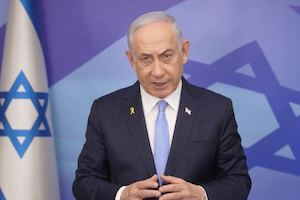
Let me know if you'd like it phrased more formally or in a journalistic tone.On the 25th, U.S. President Donald Trump posted on his social media platform "Truth Social," stating that the corruption charges against Israeli Prime Minister Benjamin Netanyahu are "politically motivated." He called on Israel to immediately cancel the trial against Netanyahu or have the president grant him a pardon. Netanyahu had publicly declared the previous day that Israel has never had a better friend in the White House than Trump.
Prime Minister Netanyahu was indicted in 2019 on charges of bribery, fraud, and breach of trust. The trial proceedings began in May 2020, making Netanyahu the first sitting Israeli prime minister to stand trial as a criminal defendant. However, due to the outbreak of the Gaza war and later the conflict with Lebanon, the court proceedings were repeatedly postponed at Netanyahu's request. He finally testified in court for the first time on December 10, 2024, and has denied all charges. Netanyahu is scheduled to appear in court again next Monday.
In response, Trump posted on "Truth Social" that he and Netanyahu had just gone through an ordeal together, fighting against Israel’s enemies. He praised Netanyahu as a "warrior" and condemned the legal proceedings against him as a "political witch hunt." Trump declared that the United States saved Israel, and now it must save Netanyahu as well. He urged Israel’s judicial system to drop the trial or issue a pardon.
According to Israel’s constitution, the president holds the power of pardon. However, the current president, Isaac Herzog, stated that granting a pardon to Netanyahu is not on the current agenda, indirectly rejecting Trump’s call.
- Read more
- 95 reads
NATO Allies Agree to Raise Defense Spending to 5% of GDP; Trump Elated and Supports Continued U.S. Membership in NATO
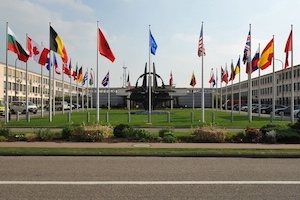
On June 24–25, a NATO summit was held in The Hague, Netherlands. Following the summit, NATO leaders issued a five-point statement reaffirming unity and pledging that member nations would commit 5% of their annual GDP to defense and security spending by 2035. This increase is intended to address the long-term threat posed by Russia and to enhance transatlantic defense industry cooperation. The next NATO summit in 2026 will be held in Turkey.
U.S. President Donald Trump made a special trip to the Netherlands to attend the summit. Before boarding his flight, he expressed frustration—using explicit language—over Israel and Iran exchanging missile fire despite agreeing to a ceasefire. During a media session alongside NATO Secretary General Mark Rutte, Trump likened the Israel-Iran conflict to "two unruly children fighting," to which Rutte responded by comparing Trump to a father trying to mediate a quarrel.
Ukrainian President Volodymyr Zelenskyy also spoke with Trump at the summit in what was reported to be a positive and constructive interaction. Trump stated he might provide additional Patriot missiles to Ukraine to defend against ongoing Russian airstrikes. He also acknowledged that negotiating a Russia-Ukraine ceasefire has proven "much more difficult than expected," noting that "Putin is not easy to deal with" and admitting there had been issues with Zelenskyy in the past as well.
Trump used the context of the Russia-Ukraine war to underscore the urgency and importance of a strong defense industrial base. He stressed that NATO members must not rely on foreign adversaries for critical minerals. In May, the U.S. and Ukraine signed a mineral agreement to secure natural resources and ensure continued American support for Ukraine.
As a response to these concerns—and aligning with Trump’s long-standing demands—the joint statement from the summit declared that NATO allies would raise their defense spending to 5% of GDP. Of this, 3.5% will go toward core defense needs, and 1.5% will be allocated to protecting infrastructure and strengthening the defense industrial base.
- 85 reads
U.S. Officials Admit Iran's Enriched Uranium "Missing"; Experts Warn of Worst-Case Scenario
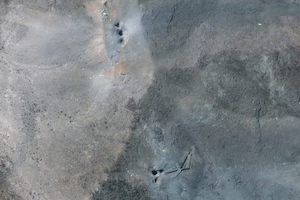
The U.S. military launched "Operation Midnight Hammer," targeting three of Iran’s major nuclear facilities: Isfahan, Natanz, and Fordow.
The operation involved 157 aircraft and B-2 bombers, which deployed rare GBU-57 bunker-buster bombs. While the strike caused significant damage, the Fordow facility was not completely destroyed. Iran claimed it had already relocated over 400 kilograms of uranium enriched to 60% purity, raising doubts about whether the operation achieved its intended strategic objectives.
U.S. Vice President and senior officials admitted they do not know the current whereabouts of the enriched uranium. The International Atomic Energy Agency (IAEA) stated it is unable to verify the uranium’s location due to the ongoing conflict. According to the IAEA, the missing 409 kilograms of enriched uranium is enough to produce ten nuclear warheads, fueling concerns that Iran could be using the chaos of war to shield its nuclear program.
Nuclear nonproliferation experts noted that while the U.S. airstrikes were tactically successful, key Iranian facilities and centrifuges were not fully destroyed, and new installations are reportedly nearing operational status. Analysts estimate Iran could acquire weapons-grade uranium within five months. Some argue that reviving the Iran nuclear deal may be a more effective deterrent than military action.
- 63 reads
Belarus Releases Key Political Prisoner, Signs of Thaw in U.S.-Russia Relations
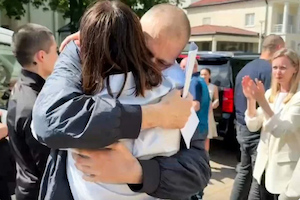
At the urging of the United States, the Belarusian government on the 22nd released several political prisoners, including high-profile opposition leader Sergei Tikhanovsky. The move is being interpreted as a concrete sign of warming relations between the U.S. and Russia, Belarus's close ally.
According to Agence France-Presse (AFP), since U.S. President Donald Trump returned to the White House, he has pursued direct dialogue with Russian President Vladimir Putin, marking a departure from previous U.S. policies of distancing from Moscow. Instead, the Trump administration has pushed for normalization of bilateral ties, with both countries stressing deeper cooperation on diplomatic and security issues.
Tikhanovsky’s release came just hours after Belarusian President Alexander Lukashenko met with U.S. envoy Keith Kellogg in Minsk—an eye-catching development in both timing and symbolism. Tikhanovsky's wife, Svetlana Tikhanovskaya, herself a prominent opposition figure, expressed gratitude to the Trump administration for its mediation. “Words cannot express the joy in my heart,” she wrote on social platform X. Tikhanovskaya had taken her husband’s place in the 2020 presidential election after his arrest, ultimately losing but continuing her advocacy from exile as a leading voice of Belarus’s opposition movement.
European leaders also welcomed the news. European Commission President Ursula von der Leyen said it was "a powerful symbol of hope" for all political prisoners suffering under Lukashenko's regime. Polish Foreign Minister Radoslaw Sikorski expressed “sincere joy,” while Latvian President Edgars Rinkevics called the release “long-awaited and overdue.” German Deputy Foreign Minister Johann Wadephul also posted on X, calling it “excellent news.”
Tikhanovsky, 46, was arrested in the run-up to Belarus’s 2020 presidential election and has spent over five years in prison. He had planned to challenge Lukashenko’s decades-long rule, but was detained weeks before the vote. His wife stepped in to run in his place but lost, later fleeing the country.
In addition to Tikhanovsky, the release included 13 others, among them Radio Free Europe/Radio Liberty journalist Igor Karnei, who had been imprisoned in 2023 on charges of involvement with an “extremist organization.” His release, along with others, suggests Belarus may be attempting to ease its long-standing political repression under growing international pressure.
- 130 reads
Israel Launches Another Airstrike on Iran, Targets Nuclear Facility in Isfahan
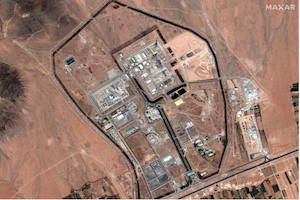
Tensions in the Middle East have flared once again. In the early hours of the 20th local time, the Israel Defense Forces launched a new wave of airstrikes on the central Iranian city of Isfahan, specifically targeting critical nuclear facilities. According to reports, the attack was aimed at uranium enrichment plants and missile development centers, marking part of Israel’s ongoing campaign against Iran’s military and nuclear infrastructure.
Iranian state media reported several explosions in the early morning hours, with Isfahan’s air defense systems activated and successfully intercepting some drones and missiles. However, sources close to Iran’s Islamic Revolutionary Guard Corps revealed that the strikes still caused some damage to the nuclear facilities. The extent of the damage and any potential casualties have not yet been disclosed.
Isfahan is a major hub for Iran’s nuclear program, hosting multiple facilities related to uranium conversion and enrichment, including support sites for the Natanz nuclear complex. These have long been viewed by Israel as significant threats. While Israel’s Defense Ministry has not officially acknowledged the operation, a senior official speaking anonymously to foreign media stated the strike was intended to “delay Iran’s progress toward acquiring nuclear weapons” and emphasized that “all options remain on the table.”
Iran’s Foreign Ministry condemned the attack as “a blatant act of aggression,” warning that any continued Israeli overreach would be met with a “swift and decisive response.” Iran’s ambassador to the United Nations has also filed a formal complaint to the Security Council, calling on the international community to condemn Israel’s military actions.
The international community is watching the situation closely. The United States stated it is monitoring developments and urged both sides to exercise restraint to prevent further escalation. The European Union once again called for the resumption of negotiations over Iran’s nuclear deal to avoid pushing the region into broader military conflict.
This strike comes amid already heightened tensions between Israel and Iran, raising concerns that the Middle East could spiral into a larger-scale war.
- 73 reads
Iranian Deputy Foreign Minister: If U.S. Joins Forces with Israel, the Middle East Will Descend into Hell
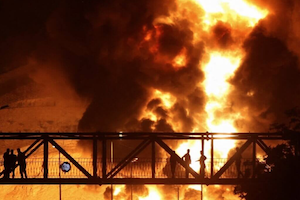
U.S. President Donald John Trump stated through a White House spokesperson on the 19th that he will decide within two weeks whether to take action against Iran. In response, Iranian Deputy Foreign Minister Saeed Khatibzadeh warned in a media interview that if the United States joins Israel's airstrikes, the entire region will descend into a hellish situation.
Khatibzadeh emphasized that the conflict between Israel and Iran is not America's war. If the U.S. intervenes, it will only deepen the crisis and delay the end of brutal acts. He added that Trump would be remembered as a president who got involved in a war that did not belong to him.
Referring to Trump’s repeated claims that Iran could have avoided the conflict by accepting the nuclear deal, Khatibzadeh revealed that negotiations between Iran and the U.S. were ongoing before the Israeli attacks. He said the talks had nearly reached an agreement before the conflict erupted and derailed the process.
Khatibzadeh stressed that diplomacy remains the preferred solution and that under the current continuous bombardment, no meaningful negotiations can take place. He reiterated that Iran’s retaliation against Israel is a legitimate act of self-defense under Article 51 of the United Nations Charter.
The International Atomic Energy Agency (IAEA) recently stated that Iran has now accumulated enough enriched uranium with a purity of 60%, just one step away from weapons-grade level at 90%. Khatibzadeh dismissed this as baseless, insisting that Iran has never had any plans to develop nuclear weapons.
- 88 reads
Thai PM's Leaked Call with Cambodia's Strongman Hun Sen Sparks Crisis as Allies Turn Away
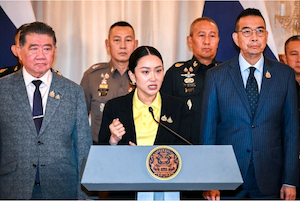
Thailand and Cambodia clashed at the border on the 28th of last month, resulting in the death of a Cambodian soldier. The two countries held negotiations at the border over the past weekend, but both sides maintained a hardline stance, and no consensus was reached.
A leaked audio recording of a phone conversation between Thai Prime Minister Paetongtarn Shinawatra and Cambodian strongman Hun Sen on the 15th surfaced online, sparking widespread discontent within Thailand. In response, all ministers from the Bhumjaithai Party—the second-largest party in the ruling coalition—tendered their resignations and withdrew from the government.
The Bhumjaithai Party accused Paetongtarn of compromising Thailand’s sovereignty, territorial integrity, national interests, and the military. Without Bhumjaithai’s support, the Pheu Thai Party can no longer maintain a majority in the House of Representatives, making future governance significantly more difficult. Natthaphong Ruengpanyawu, leader of the opposition People’s Party—the largest opposition party—declared that the incident had destroyed the prime minister’s credibility and called for the dissolution of the House and fresh elections.
At a press conference, Paetongtarn apologized to the Thai people for the leaked recording, urging national unity, an end to internal strife, and the protection of national sovereignty. She emphasized that the government fully supports the military in all aspects. Meanwhile, protesters gathered outside the Prime Minister’s Office, demanding her resignation.
Hun Sen is the father of current Cambodian Prime Minister Hun Manet, while Paetongtarn is the daughter of former Thai Prime Minister Thaksin Shinawatra. Both former leaders maintain a close personal relationship and remain active in politics.
- Read more
- 150 reads
Israeli Hacker Group Cripples Iran’s National Bank, Causes Total Collapse of Online Financial System

Iran’s state-owned Sepah Bank was recently hit by a devastating cyberattack, causing widespread system failures. Online banking services, digital platforms, and ATMs were all shut down. The hacker group behind the attack claimed to have completely destroyed internal data, resulting in wiped customer accounts and non-functional debit cards.
The group, known as Predatory Sparrow, is suspected to have ties to the Israeli government. It launched a large-scale cyber offensive targeting Sepah Bank, triggering major disruptions across Iran’s financial and communication infrastructure. In a statement posted on social media on the 17th, the group said it specifically targeted Sepah Bank due to its close connections with Iran’s Islamic Revolutionary Guard Corps (IRGC), accusing the bank of helping the government evade international sanctions and funding terrorism and nuclear development programs. The hackers framed the operation as an act of justice.
While Israel has not officially acknowledged any connection to Predatory Sparrow, local media widely believe the group is affiliated with Israeli intelligence. Cybersecurity experts have also linked the group to previous incidents, including the 2021 cyberattack that crippled gas stations across Iran and the 2022 hacking of an Iranian steel plant, which led to fires and physical damage. Experts argue that the sophistication of these attacks suggests state-level capabilities.
Following the most recent breach, widespread internet disruptions were reported across Iran. Connectivity issues plagued much of the country, and Cloudflare data showed near-total outages at two major mobile internet providers, effectively plunging Iran into a state of "internet lockdown." While Iranian authorities claimed the issues were due to "technical problems," the complete shutdown of multiple banking services and reports from the public about inoperative ATMs and inaccessible financial services painted a different picture.
Several major banks, including Melli, Pasargad, and Eghtesad-e Novin, also experienced outages and card malfunctions. Fars News Agency confirmed that the cyberattack crippled Sepah Bank’s remote services and warned that gas stations supported by the bank’s infrastructure might also face disruptions.
- Read more
- 776 reads
Israel Launches Night Raid on Iran, Claims to Have Killed Top Military Commander Shademani
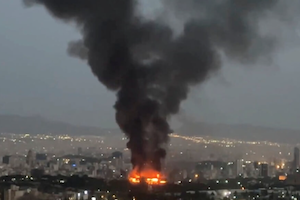
Israel and Iran remain locked in ongoing conflict, with tensions between the two nations continuing to escalate. On June 17, the Israeli military claimed it had successfully killed Iran's top military commander, Ali Shadmani, during a nighttime airstrike operation. Shadmani, a close confidant of Iran’s Supreme Leader Ayatollah Ali Khamenei, held high-ranking positions within both the Islamic Revolutionary Guard Corps (IRGC) and the Iranian Armed Forces.
According to a report by Agence France-Presse (AFP), the Israeli military stated that its air force launched a precision strike in central Tehran, targeting a staffed command center. During the operation, they said they seized a “sudden opportunity” to eliminate Shadmani, described as the “wartime chief of staff” and the military leader closest to Khamenei. Shadmani had only been in his position for four days. His death is seen as a significant blow to Iran’s military structure.
- Read more
- 139 reads
Iran Launches New Wave of Missile Attacks on Israel; U.S. Consulate in Tel Aviv Damaged
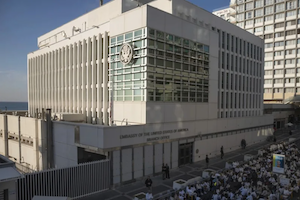
In the early morning of June 16 (local time), Iran launched a new large-scale missile attack, firing dozens of missiles at Israeli territory. Air raid sirens sounded across the country. According to Israeli media reports, the attack resulted in casualties in several cities, including Tel Aviv, with at least five people killed and dozens injured. Residential and commercial facilities suffered severe damage.
In Tel Aviv, the intense shockwaves from the explosions caused minor damage to the U.S. Consulate building, including shattered windows and damaged external structures. No consulate staff were injured. U.S. Ambassador to Israel Mike Huckabee announced on X (formerly Twitter) that both the Tel Aviv consulate and the Jerusalem embassy would be temporarily closed for the day while safety assessments and evacuation procedures were carried out.
Iran’s state-run news agency IRNA cited a statement from the Islamic Revolutionary Guard Corps (IRGC), claiming that the missile strikes had "successfully and effectively hit" multiple targets within Israel. In response, Israeli authorities stated that their air defense systems—including the Patriot and Iron Dome—intercepted many of the missiles, but were unable to stop all of them.
This incident marks the fourth day of escalating conflict between Iran and Israel. Previously, Israel had launched airstrikes targeting Iran’s nuclear facilities and military sites, reportedly causing heavy casualties on the Iranian side (estimated at 224 dead and 1,277 injured, with over 90% being civilians).
On the U.S. side, President Trump had earlier intervened to stop an Israeli plan to assassinate Iran’s Supreme Leader Ali Khamenei and warned that if any American personnel were injured, the U.S. would respond with strong measures.
- 115 reads
Human Rights
Fostering a More Humane World: The 28th Eurasian Economic Summi

Conscience, Hope, and Action: Keys to Global Peace and Sustainability

Ringing FOWPAL’s Peace Bell for the World:Nobel Peace Prize Laureates’ Visions and Actions

Protecting the World’s Cultural Diversity for a Sustainable Future

Puppet Show I International Friendship Day 2020

